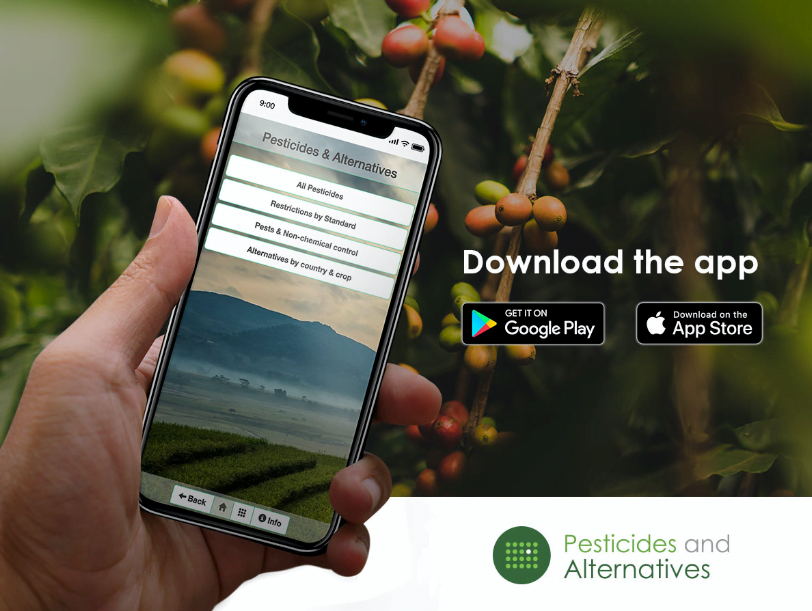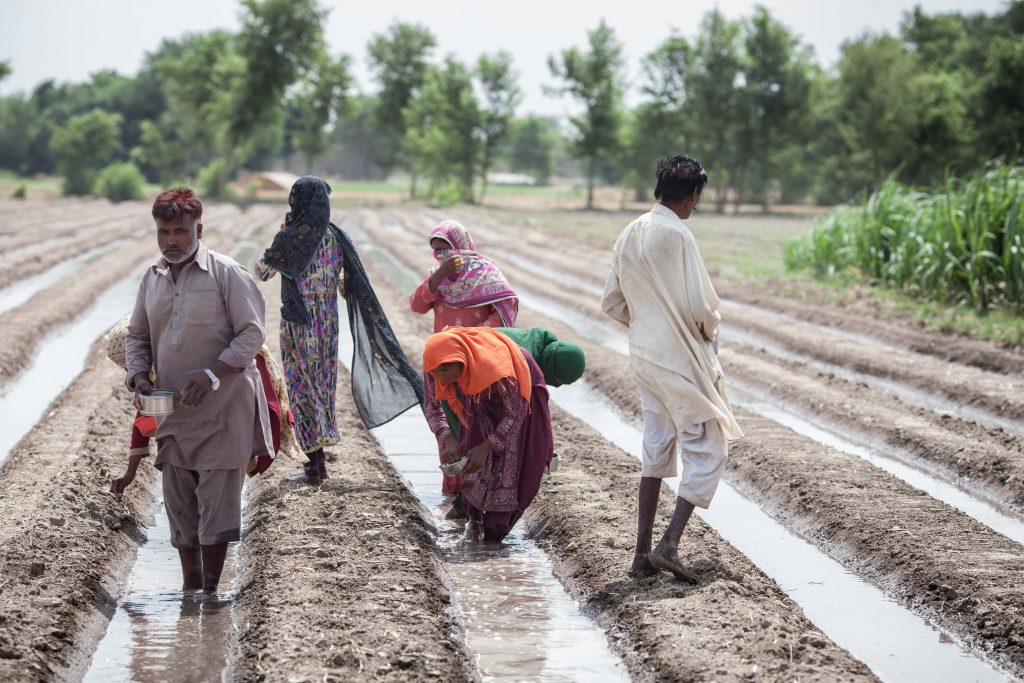Better Cotton Country Snapshots 2018-19 Cotton Season
Snapshots of activity in Better Cotton countries from Brazil to Israel
Read moreSnapshots of activity in Better Cotton countries from Brazil to Israel
Read moren 2019, we celebrated the Better Cotton Initiative’s (BCI’s) 10-year anniversary. BCI has come a long way since a visionary group of farmers, NGOs and apparel brands first came together to transform the way cotton is grown
Read moreBy 2018, Better Cotton represented 22% of Australia’s cotton lint. Here, Brooke Summers, Supply Chain Consultant at Cotton Australia, explains how harmonising the two standards is helping to deliver more sustainable cotton to the world.
Read moreIn the 2017-18 cotton season, Lupin Foundation began training 12,000 cotton farmers on more sustainable farming practices in line with the Better Cotton Principles and Criteria.
Read moreToday, a coalition of nine sustainability initiatives and standards launched a new “Pesticides and Alternatives’ app, specially designed to reduce the use of highly toxic pesticides in agriculture.
The Integrated Pest Management (IPM) Coalition believe that reducing the use of highly toxic pesticides and offering relevant information about non-chemical pest control alternatives is critical in a world where around two million tonnes of pesticides are consumed every year1and inappropriate or improper use can affect human health, contaminate water sources, food crops and the environment more broadly.
The new app combines technology and scientific knowledge to create an effective and easy-to-use tool for auditors and decision-makers managing farms, fields and forest plantations. The app is available to download via Google Play or iTunes and contains:
The development of the app was possible thanks to the ISEAL Innovations Fund, the scientific support of the Oregon State University’s Integrated Plant Protection Center (OSU-IPPC), data facilitation from CABI and the collaboration of the IPM Coalition members: Better Cotton Initiative, Bonsucro, Fairtrade, Forest Stewardship Council, GEO Foundation, Global Coffee Platform, Rainforest Alliance, Roundtable on Sustainable Biomaterials, and the Sustainable Agriculture Network.
IPM Coalition members work together towards the common goal of improving knowledge and sustainable use of agrochemicals, including reducing or eliminating highly hazardous pesticides. The app has been launched to make the pesticide information on the Coalition’s online database more widely available for the countries covered.
Find out more about the “Pesticides and Alternatives’ app (video) and the IPM Coalition.
This project was possible thanks to a grant from the ISEAL Innovations Fund, which is supported by the Swiss Government’s Federal Department of Economic Affairs, Education and Research (EAER).


Notes
1.https://onlinelibrary.wiley.com/doi/full/10.1002/fes3.108 / http://www.ecotippingpoints.org/video/india/etp-pesticide.pdf
2.CABIis a not-for-profit scientific research, publishing and international development organisation. It is also one of BCI’s long-standing Implementing Partners.
3.One of theBetter Cotton Principlesfocuses on reducing the harmful impact of crop protection practices. In 2018, the Better Cotton Initiative increased its emphasis on environmental principles to strengthen the Better Cotton Standard. Our reinforced approach towards pesticide use and restriction includes phasing out highly hazardous pesticides and banning pesticides listed in the Rotterdam Convention (a treaty to promote shared responsibilities in relation to importation of hazardous chemicals).
Read moreEarth Day 2019 encourages us all to “Protect Our Species’ and reduce our impact on the planet. From using pesticides derived from ingredients found in nature, to undertaking biodiversity mapping, BCI Farmers are taking multiple approaches to protecting and enhancing the natural environment, while producing cotton in a sustainable way.
Read moreHelping BCI Farmers in China Conserve Water and Raise Yields Despite Extreme Weather
Read more“Precision irrigation and water-saving techniques are becoming more important as water scarcity concerns rise. The Better Cotton Initiative and Cotton Australia are helping farmers raise their yields, improve their resilience to extreme weather and protect the environment.” Rick Kowitz, Cotton Australia, 2019
Read moreBCI works with on-the-ground partners and cotton farmers around the world to address critical water challenges in cotton production.
Read more
The United Nations Industrial Development Organisation (UNIDO) has launched a multi-stakeholder pilot project in Egypt, to train cotton farmers on the Better Cotton Initiative’s holistic approach to sustainable cotton production. The pilot comes as part of a renewed drive in the country to increase sustainability and improve conditions for Egyptian cotton producers.
Funded by the Italian Agency for Development Cooperation, the project is implemented by UNIDO in collaboration with the Ministry of Trade and Industry, the Ministry of Agriculture and Land Reclamation as well as with local and international textile private sector stakeholders. The Better Cotton Initiative (BCI), in coordination with selected Implementing Partners, will support UNIDO on the activation of the pilot in select areas inEgyptduring the 2018-19 cotton season. BCI will provide guidance, share knowledge, develop materials and provide relevant agricultural and cotton experts.
Approximately 5,000 smallholder cotton farmers will be involved in the initial pilot project, receiving training on the Better Cotton Principles and Criteria. By adhering to these principles, existing (licensed) BCI Farmers around the world produce cotton in a way that is measurably better for the environment and farming communities.
“BCI supports all initiatives that seek to make cotton production more sustainable. Egyptian cotton is long staple cotton grown by smallholder farmers. Making the Better Cotton Standard System accessible to smallholder farmers is BCI’s priority – 99% of the farmers BCI works with today are smallholders,” says Alia Malik, Director of Implementation at BCI.
Once thepilotis complete, and in coordination with relevantEgyptian governmental entities and private sector stakeholders, UNIDO and BCI will explore the possibility of supporting the start-up of a direct BCI Programme inEgypt.
Read moreThe Better Cotton Initiative has worked with field-level partner, WWF Pakistan, for a decade to help farmers produce cotton in a more sustainable way.
Read more
In 2018, the Better Cotton Initiative (BCI) experienced a historic level of uptake1as 93 Retailer and Brand Members sourced more than one million metric tonnes of Better Cotton – that’s enough cotton to make approximately 1.5 billion pairs of jeans.
Better Cotton uptake increased 45% on the previous year, and at the end of 2018, retailer and brand member sourcing of Better Cotton accounted for 4% of global cotton consumption2. By integrating Better Cotton into their sustainable sourcing strategies and increasing sourcing commitments year-on-year, BCI’s Retailer and Brand Members are driving demand for more sustainable cotton production worldwide.
Now, to continue to accelerate the mainstreaming of Better Cotton and hit BCI’s 2020 targets – to reach and train 5 million cotton farmers and have Better Cotton account for 30% of global cotton production – BCI needs the next wave of sustainability leaders to come on board and close the gap between supply and demand. (In the 2017-18 cotton season, Better Cotton is forecast to account for 19% of global cotton production.)
Founding BCI Member, H&M group, has played an integral role in the growth of Better Cotton; in 2018 the retailer sourced the largest volume of Better Cotton (for the third year running). ”Cotton is one of H&M group’s most important materials – BCI plays a key role in our goal towards using only sustainably sourced cotton by 2020,” says Mattias Bodin, Sustainability Business Expert, Materials and Innovation at H&M group.
adidas is another founding member with ambitious sustainable sourcing targets. In 2018, adidas sourced 100% of its cotton as more sustainable cotton. Ebru Gencoglu, Senior Manager, Merchandising and Sustainability at adidas commented, ”BCI and adidas have worked closely from the beginning to reach this ambitious goal. BCI has engaged actors throughout the supply chain to enable the right amount of supply in the right locations. This has helped our suppliers to source cotton as Better Cotton, which allowed us to ramp up sourcing in a short period of time.”
BCI’s demand-driven funding model means that retailer and brand sourcing of Better Cotton directly translates into increased investment in training for cotton farmers on more sustainable practices. For example, in the 2017-18 cotton season, BCI Retailer and Brand Members, public donors and IDH (the Sustainable Trade Initiative) contributed more than ‚Ǩ6.4 million, enabling more than 1 million farmers across China, India, Mozambique, Pakistan, Tajikistan, Turkey and Senegal to receive support and training*.
ALDI South Group are among a group of new BCI Members who will help to increase uptake of Better Cotton in 2019 and beyond. Katharina Wortman, Director CRI at ALDI South Group said, ”ALDI supports sustainable cotton standards in their aim to ensure improved farming conditions and reduced environmental impacts. ALDI joined BCI at the end of 2017, and we foresee that BCI will play a significant role in our approach to responsibly sourced cotton. The mass-balance chain of custody system used by BCI enables our supply chain partners to more easily source Better Cotton.”
A member that has illustrated how to scale uptake of Better Cotton rapidly is Gap Inc. The retailer joined BCI in 2016 and is now among the top five BCI Retailer and Brand Members based on total Better Cotton sourcing volumes. ”Better Cotton sourcing is an important part of Gap Inc.’s sustainability strategy. We have been able to leverage our scale across our portfolio of brands to accelerate sourcing of Better Cotton in a relatively short time,” said Agata Smeets, Director, Sustainability Sourcing Strategy at Gap Inc.
As well as increased investment in farmer training and capacity building, uptake of Better Cotton sends a clear signal to the market and has an impact throughout the supply chain. Cotton traders are seeing the increased demand for more sustainably produced cotton but believe there is much more to be done. Marco Baenninger, Head Trader Hand Picked Cotton at PaulReinhartAG said, ”Better Cotton has become an integral part of the international cotton trade. It’s very pleasing to see that uptake from retailers has increased strongly over the last few years. However, there is still a lot to do. Some organisations are still skeptical, but in the long-term they risk losing market share if they overlook more sustainable options. That says a lot about the success of BCI and other sustainable cotton initiatives and standards in promoting sustainably produced cotton.”
Transforming cotton production worldwide requires commitment and collaboration from the entire cotton supply chain. As we celebrate BCI’s 2018 sourcing milestone, we thank all of our members and partners for supporting BCI. The retailers and brands, cotton traders and spinners who sourced the highest volumes of Better Cotton in 2018 will be revealed in the Better Cotton Leaderboard, launching at the 2019 Global Cotton Sustainability Conference in Shanghai in June.

